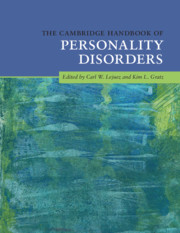Book contents
- The Cambridge Handbook of Personality Disorders
- The Cambridge Handbook of Personality Disorders
- Copyright page
- Contents
- Figures
- Tables
- Contributors
- Preface
- Part I Etiology
- Part II Models
- 5 Controversies in the Classification and Diagnosis of Personality Disorders
- 5a Three Unresolved Conceptual Issues in Personality Disorders: Commentary on Controversies in the Classification and Diagnosis of Personality Disorders
- 5b Classification of Complex Disorders Is a Challenge Solved by Simplicity: Commentary on Controversies in the Classification and Diagnosis of Personality Disorders
- 5c Final Thoughts: Author Rejoinder to Commentaries on Controversies in the Classification and Diagnosis of Personality Disorders
- 6 Categorical Models of Personality Disorders
- 6a Good Taxonomy Can Address Classification Challenges in Personality Pathology by Providing Informative Priors That Balance Information Compression and Fidelity: Commentary on Categorical Models of Personality Disorders
- 6b A Hierarchical, Dimensional Approach Can Advance Personality Disorder Research: Commentary on Categorical Models of Personality Disorders
- 6c The Search for Clinically Meaningful Dimensions Requires a Clinical Theory: Author Rejoinder to Commentaries on Categorical Models of Personality Disorders
- 7 The Five-Factor Model of Personality Disorders
- 7a Personality Disorders are Disorders of Personality: Commentary on the Five-Factor Model of Personality Disorders
- 7b Assessment and Operationalization of Personality Disorders from a Five-Factor Model Perspective: Commentary on the Five-Factor Model of Personality Disorders
- 7c Challenges but Optimism Regarding the Adoption of Trait Models of Personality Disorders: Author Rejoinder to Commentaries on the Five-Factor Model of Personality Disorders
- 8 Interpersonal Models of Personality Pathology
- 8a Interpersonal Nuance in Context: Commentary on Interpersonal Models of Personality Pathology
- 8b Contextual Dynamics in the Interpersonal Theory of Personality and Personality Disorder: Commentary on Interpersonal Models of Personality Pathology
- 8c Expanding on Interpersonal Models of Personality Pathology: Author Rejoinder to Commentaries on Interpersonal Models of Personality Pathology
- Part III Individual Disorders and Clusters
- Part IV Assessment
- Part V Treatment
- Index
- References
5a - Three Unresolved Conceptual Issues in Personality Disorders: Commentary on Controversies in the Classification and Diagnosis of Personality Disorders
from Part II - Models
Published online by Cambridge University Press: 24 February 2020
- The Cambridge Handbook of Personality Disorders
- The Cambridge Handbook of Personality Disorders
- Copyright page
- Contents
- Figures
- Tables
- Contributors
- Preface
- Part I Etiology
- Part II Models
- 5 Controversies in the Classification and Diagnosis of Personality Disorders
- 5a Three Unresolved Conceptual Issues in Personality Disorders: Commentary on Controversies in the Classification and Diagnosis of Personality Disorders
- 5b Classification of Complex Disorders Is a Challenge Solved by Simplicity: Commentary on Controversies in the Classification and Diagnosis of Personality Disorders
- 5c Final Thoughts: Author Rejoinder to Commentaries on Controversies in the Classification and Diagnosis of Personality Disorders
- 6 Categorical Models of Personality Disorders
- 6a Good Taxonomy Can Address Classification Challenges in Personality Pathology by Providing Informative Priors That Balance Information Compression and Fidelity: Commentary on Categorical Models of Personality Disorders
- 6b A Hierarchical, Dimensional Approach Can Advance Personality Disorder Research: Commentary on Categorical Models of Personality Disorders
- 6c The Search for Clinically Meaningful Dimensions Requires a Clinical Theory: Author Rejoinder to Commentaries on Categorical Models of Personality Disorders
- 7 The Five-Factor Model of Personality Disorders
- 7a Personality Disorders are Disorders of Personality: Commentary on the Five-Factor Model of Personality Disorders
- 7b Assessment and Operationalization of Personality Disorders from a Five-Factor Model Perspective: Commentary on the Five-Factor Model of Personality Disorders
- 7c Challenges but Optimism Regarding the Adoption of Trait Models of Personality Disorders: Author Rejoinder to Commentaries on the Five-Factor Model of Personality Disorders
- 8 Interpersonal Models of Personality Pathology
- 8a Interpersonal Nuance in Context: Commentary on Interpersonal Models of Personality Pathology
- 8b Contextual Dynamics in the Interpersonal Theory of Personality and Personality Disorder: Commentary on Interpersonal Models of Personality Pathology
- 8c Expanding on Interpersonal Models of Personality Pathology: Author Rejoinder to Commentaries on Interpersonal Models of Personality Pathology
- Part III Individual Disorders and Clusters
- Part IV Assessment
- Part V Treatment
- Index
- References
Summary
In a thoughtful and scholarly review, Paris (this volume) considers a variety of challenges and controversies besetting the personality disorders field. The author of this commentary concurs with most of his arguments. However, he examines three unresolved conceptual challenges in the personality disorders field that are largely unmentioned by Paris: (1) the relation between general personality traits and personality pathology, along with the possibility that some personality disorders reflect maladaptive configurations (interactions) among these traits; (2) the distinction between basic tendencies and characteristic adaptations, along with the possibility that criterion sets for some personality disorders (e.g., borderline personality disorder) reflect complex admixtures of both; (3) the implications of recently developed network models of psychopathology for conceptualizing personality disorders. Aided by statistical advances, the personality disorders field has made impressive scientific progress in some respects, but it needs to invest more of its time and energy addressing foundational conceptual questions.
Keywords
- Type
- Chapter
- Information
- The Cambridge Handbook of Personality Disorders , pp. 111 - 114Publisher: Cambridge University PressPrint publication year: 2020
References
- 1
- Cited by

